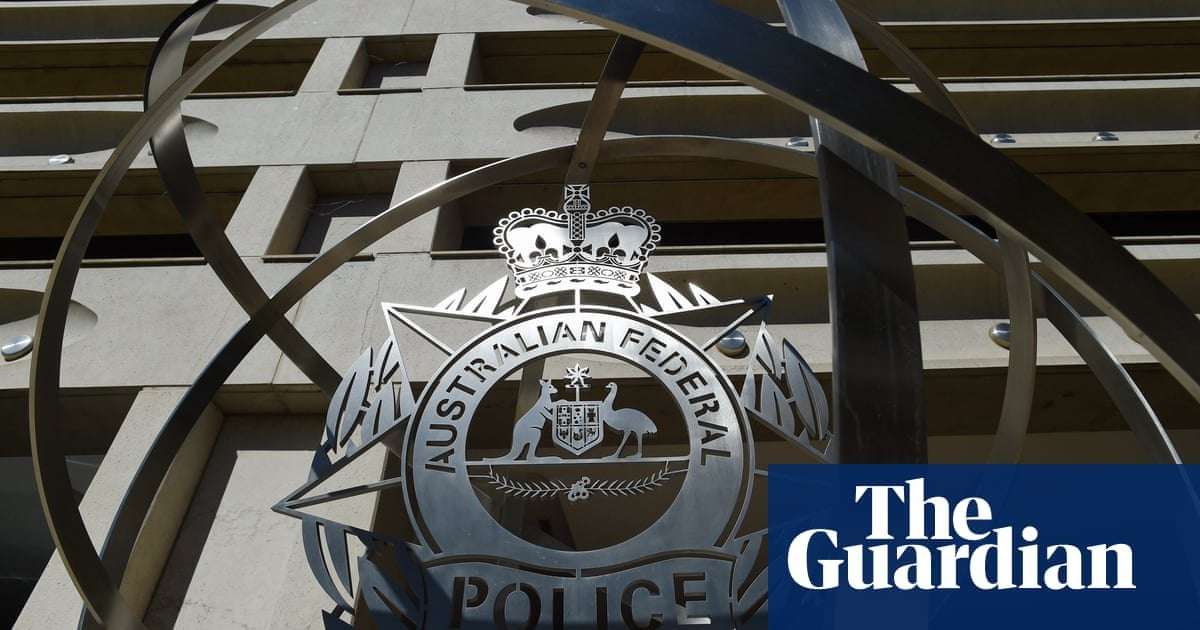AFP officers execute search warrant over 2018 report about new powers for intelligence agencies to spy on Australians
The Australian federal police have raided the home of News Corp Australia journalist Annika Smethurst investigating the publication of a leaked plan to allow government spying on Australians.
On Tuesday police executed a warrant investigating the “alleged publishing of information classified as an official secret” which they said had the potential to undermine Australia’s national security.
The warrant from an ACT magistrate gave police authority to search the home, computer and mobile phone of the News Corp Sunday titles’ political editor.
The raid prompted outrage from News Corp Australia, which labelled it a “dangerous act of intimidation” targeted at public interest reporting.
In April 2018 Smethurst reported that the heads of the defence and home affairs ministries had discussed draconian new powers to allow the Australian Signals Directorate to spy on Australian citizens for the first time.
Under the mooted plan, spies would be allowed to secretly access emails, bank accounts and text messages with approval from the defence and home affairs ministers.
Australian National University hit by huge data breach Read more
Under current laws the Australian federal police and domestic spy agency Asio have the power to investigate Australians with a warrant and seek technical advice from ASD, which is not permitted to produce intelligence on Australians.
In a statement the AFP confirmed it had executed a search warrant at a residence in an ACT suburb on Tuesday.
“The matter relates to an investigation into the alleged unauthorised disclosure of national security information that was referred to the AFP,” the agency said in a statement.
“This warrant relates to the alleged publishing of information classified as an official secret, which is an extremely serious matter that has the potential to undermine Australia’s national security.
“No arrests are expected today as a result of this activity.”
In a statement News Corp Australia described the raid as “outrageous and heavy-handed”.
“The Australian public’s right to know information about government laws that could impact their lives is of fundamental importance in our society,” it said.
“This raid demonstrates a dangerous act of intimidation towards those committed to telling uncomfortable truths.”
News Corp Australia said it had “expressed the most serious concerns” about erosion of the Australian public’s right to know about government decisions that “can and will impact ordinary Australian citizens”.
“What’s gone on this morning sends clear and dangerous signals to journalists and newsrooms across Australia. This will chill public interest reporting.”
Digital Rights Watch chairman, Tim Singleton Norton, said it was “incredibly worrying” to see a raid investigating a public interest issue of “potential massive expansion of domestic capacity in Australian spy agencies”.
“We fear that the powers given to the AFP to seize and search Annika Smethurst’s digital footprint represent a considerable risk to bold Australians who choose to expose wrongdoing in the public services,” he said.
“This is a gross abuse of national security powers – using them to reinforce a culture of secrecy and lack of accountability in our law enforcement apparatus.”
Australian law prohibits unauthorised disclosure of information by commonwealth officers, an offence which gives police powers to investigate leaks informing public interest journalism.
Australia also has offences which make it unlawful for non-commonwealth officers to communicate or deal with information that has a security classification of secret or top secret or “damages the security or defence of Australia”.
Journalists have a defence of dealing with protected information where they “reasonably believe” it is in the public interest to do so, but the media union has warned the law still effectively criminalises journalism.
Police have conducted raids investigating leaks about the national broadband network, Peter Dutton’s ministerial intervention in the case of two foreign au pairs, and foreign targets of Australia’s spying.

xug on June 4th, 2019 at 10:05 UTC »
CRAZY how the narrative is constantly being shifted to whistle blowers being in the wrong.
ScruffTheJanitor on June 4th, 2019 at 10:00 UTC »
Australia is going down a scary path, and most Aussies don't even realize (Ironically mostly due to News Corps not reporting on it while having a monopoly on news media).
Australia passes laws forcing companies to but backdoors in their software under threat of jail time and fines. https://www.techdirt.com/articles/20181208/14440541184/australian-government-passes-law-forcing-tech-companies-to-break-encryption.shtml
Australia forces citizens to hand over data on phones and laptops under threat of jails and fines (Unlike the US where you can't be forced to give your password I believe. You legally have to here). https://www.abc.net.au/news/2018-10-08/if-a-border-agent-demands-access-to-your-digital-device/10350762
And you're forcing telcos to keep your metadata for 2 years, which authorities can get without a warrant. https://www.abc.net.au/news/2018-10-19/authority-creep-has-more-agencies-accessing-your-metadata/10398348
Automatic opt-in to having an online service keep track of all your medical and health history. Which the police and agencies like the tax office have warrant-less access to. https://www.healthcareit.com.au/article/technical-chaos-and-privacy-backlash-my-health-record-opt-out-period-begins
These have little to no oversight at all and especially the first one, was rushed through to pass with so little thought and such that's its open for massive abuse. I bet insurers would LOVE to get their hands on some on peoples medical history.
Oh and also strip searches instigated by sniffer dogs (that found nothing the vast majority of the time) to save the kids! (But no pill testing, that would ENCOURAGE people to use drugs) https://thenewdaily.com.au/news/state/nsw/2018/07/29/sniffer-dogs-nsw/
Just rock up at a school with em, why not. https://www.news.com.au/technology/online/social/high-school-formal-and-wine-festival-hit-by-police-drug-dog-stings/news-story/6117f208ed83c7e65ce22237a89f9050
Privacy, whats that? We're fucked.
autotldr on June 4th, 2019 at 05:01 UTC »
This is the best tl;dr I could make, original reduced by 84%. (I'm a bot)
Extended Summary | FAQ | Feedback | Top keywords: Australian#1 Australia#2 public#3 police#4 raid#5